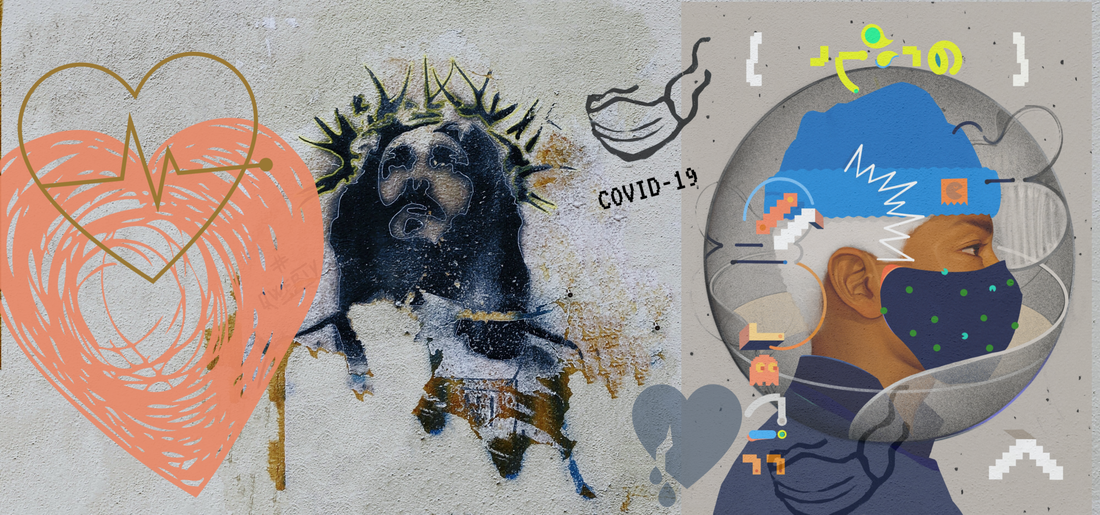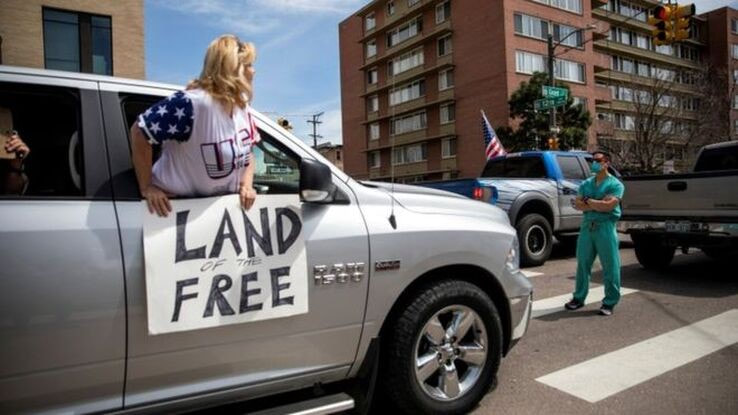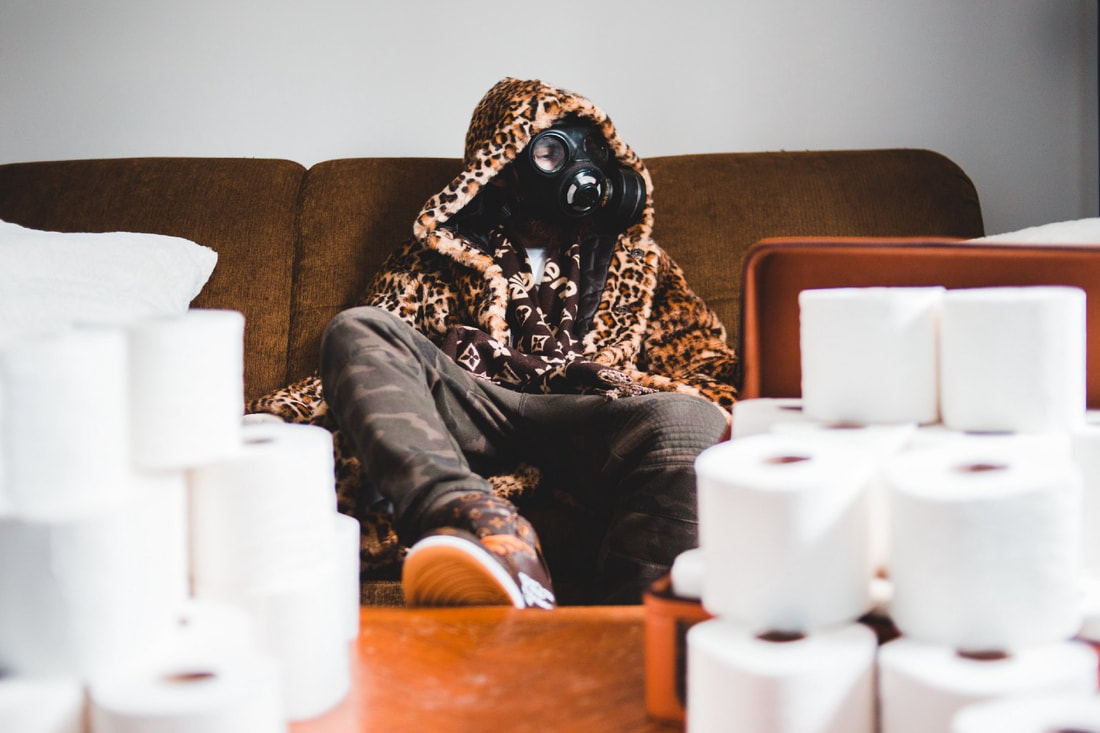There is a debate happening on the public stage in regards to COVID, freedom, masks, social distancing, and restrictions. Facebook is a minefield right now. People are angry, and rightly so. Anger is part of the grief process. Whether we like to admit it or not, we are all grieving so much. The loss of community. The loss of stability. The loss of loved ones. The loss of church, school, jobs, and life as we’ve known it. It’s a lot.
I don’t pretend to have the answers. I am not a scientist, disease specialist, or economist. The response to the pandemic is complex. However, I would push back on those that would minimize the staggering death tolls of this virus and its worldwide impact. There is no conspiracy big enough to encompass the globe. And if your privilege keeps you at a distance from the virus’ ravage, that’s something to be grateful for this Thanksgiving. In talking recently to a pastor in New York, she has lost 20 elders, pastors, and sages to the virus within her own black community. I can’t imagine! And no matter where you stand on these issues, I think we all are missing the kind of leadership that would pull us together in this critical moment.
As followers of Jesus, I believe our response should be unique — not driven by the culture wars of our day, but by Jesus’ radical example. As COVID cases and hospitalizations skyrocket across our nation, what does it mean to follow Jesus?
Jesus made it really clear. In the gospel of Mark, we see Jesus’ ministry gaining momentum as he preached and demonstrated a message of freedom and liberation. To a people who were crushed under the tyranny of empire, this was indeed good news. And just when the disciples begin to catch on that Jesus was the long-awaited Messiah upon whom rested all the Jewish hopes, their world was rocked. This kingdom was not coming in grandeur, dominion, or political power, but in suffering, humiliation, and death. It was not a “make Israel great again” campaign. If the disciples were excited about the inauguration of a new kingdom, they most likely had grand visions of greatness (Mark 8:31–33). But Jesus actually rebukes these worldly ideas about power and gives one of the most provocative and challenging invitations that rings true today.
“If any want to become my followers, let them deny themselves and take up their cross and follow me. For those who want to save their life will lose it, and those who lose their life for my sake, and for the sake of the gospel, will save it” (Mark 8:34–35).
Much of this debate has been framed around individual rights and freedom. But let us be clear, the promotion of individual rights is not a Christian value. Jesus says the exact opposite — to follow him is to lay down our rights. The kingdom of God does not come in the flexing of one’s own self-interests and political power, but in subservience, sacrifice, and the abdication of power.
The better question is, “What does it mean to love our neighbor as ourselves?” This is the most crucial discourse of our time and the greatest command. It is also the grid in which we as followers of Jesus should consider our response. This is the thinking behind our decision to cancel Thanksgiving, sacrificing our own desires to be with family in the hopes that next year, more people can be with their families. Laying down our own lives so that others can live.
But I am well aware that this view isn’t shared by all. I’m afraid the gods of individualism are now inflicting a devastating cost. Jesus said that the first would be last and this seems to hold true. “America First” is now last in the effectiveness of our pandemic response with the highest death tolls across the globe. I am no expert, but the countries that have had the best response either have leadership or a culture that is valuing the collective good over the individual. Admittedly, this is complex. We are balancing our social fabric and economic well-being against our health and the loss of lives. And yet “what will it profit them to gain the whole world and forfeit their life? Indeed, what can they give in return for their life?” (Mark 8:36–37)
This virus has exposed how connected we truly are. We are “caught in an inescapable network of mutuality, tied in a single garment of destiny. Whatever affects one directly, affects all indirectly. [Dr. Martin Luther King, Jr.]
Saint Paul said it this way, “If one member suffers, all suffer together with it; if one member is honored, all rejoice together with it,” likening us to a body, interconnected and interdependent (I Corinthians 12:26).
So as followers of Jesus, how do we sacrifice our own self-interests on behalf of our neighbor? What does love require?
As Christians, love must be the lens through which we respond.
On the other end of the spectrum, we have those who are motivated out of fear and self-preservation. They have holed up in their homes with copious amounts of toilet paper and provisions to wait it out. Loving neighbor is somewhat counter-intuitive as we are being asked to distance ourselves for the good of others. However, there are many who do not have the privilege to do so. Doctors and nurses and essential workers. Our neighbors who are experiencing homelessness and poverty or living in close quarters of prisons and detention centers. Again we must ask, what does love require?
Historically, the Christian response to plagues has been to care for the sick and consider our own lives less important than our neighbors. In fact, it was the response of the Christians to the Antonine plague and the Plague of Cyprian across the Roman empire in the second and third centuries that triggered the explosive growth of Christianity.
There are so many hurting today. Isolation, anxiety, and depression are rampant. People are spiraling under the weight of financial loss, hunger, and instability. Mental health is a huge concern. I know of pastors who have performed more funerals for suicides than Covid-related deaths. While the Christian ethic would require us to never endanger others through our negligence or recklessness, what is the invitation to love? How are we to lay down our lives for our neighbor?
Perfect love drives out fear.
Love looks different for every person. For some, love compels them to be on the front lines caring for the sick. For others who are or are caring for the vulnerable with chronic health issues, love looks like staying home. For my community, love has meant taking some calculated risks at times (still using precautions and masks) to love our unhoused and immigrant neighbors. Love has meant checking in on our elderly neighbors and those who live alone. Love has meant cultivating connection and meeting practical needs however we can. Love has meant giving our stimulus check away to those who truly need it. Love has also meant the sacrifice of staying home, wearing masks, and taking precautions so as not to endanger our neighbor.
Regardless of our political, cultural, or sociological differences, as Christians, we must resist the inclination to seek individual freedom or self-preservation. Rather, Jesus calls us to a radical, self-sacrificing love. “No one has greater love than this, to lay down one’s life for one’s friends.” (John 15:13) The self-denial and suffering of Jesus is actually the prototype for the Christian life. As this pandemic continues to rage, love beckons us, provokes us, and compels us. Love is the litmus test.
by Jessica Ketola



 RSS Feed
RSS Feed
